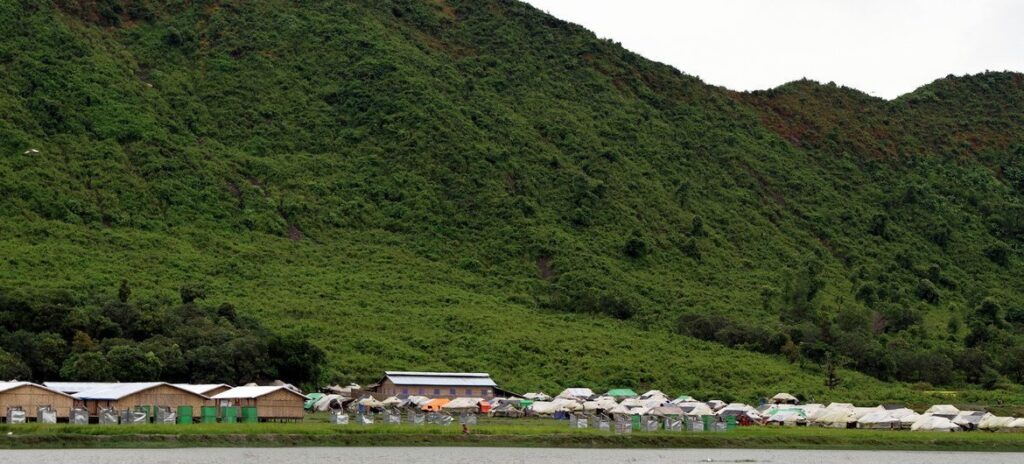More than 5,000 civilians have been killed since the February 2021 coup, with at least three million displaced. More than 20,000 political prisoners are still in custody. Military airstrikes on civilian targets have increased fivefold in the past six months, even as the junta loses military outposts, territory and troops to resistance forces.
Potential factors
In a new reportTom Andrews, UN Special Rapporteur on Myanmar, identified sixteen banks in seven countries that processed transactions related to the junta’s military tenders in the past two years.
In addition, 25 banks provided correspondent banking services to Myanmar’s state-owned banks under the junta’s control.
“With the junta hot on its heels, it is crucial that financial institutions take their human rights obligations seriously and not facilitate the junta’s deadly transactions,” he said said.
He stressed that banks involved in Myanmar’s state-owned banks face a high risk of facilitating military attacks on civilians, and emphasized their fundamental obligation to avoid facilitating crimes, including war crimes and crimes against humanity.
UN News/Vibhu Mishra
Tom Andrews, Special Rapporteur on the human rights situation in Myanmar
Good and bad news
He noted a decline in the Myanmar military’s annual purchases of weapons and military supplies through the formal banking system, from $377 million to $253 million in the year ending March 2023.
However, he warned that the junta is circumventing sanctions by exploiting gaps, shifting financial institutions and using inadequate coordination and enforcement among member states.
“The good news is that the junta is becoming increasingly isolated… the bad news is that the junta is circumventing sanctions and other measures by exploiting holes in the sanctions regimes, shifting financial institutions and taking advantage of member states’ inability to fully implement sanctions coordinate and enforce. actions,” said the Special Rapporteur.
Shift from Singapore to Thailand
The report Banking on the Death Trade: How Banks and Governments Support Myanmar’s Military Junta examined “a dramatic shift” in the role of two Association of Southeast Asian Nations (ASEAN) countries as sources of weapons and military supplies.
As a sequel to last year’s identification of Singapore as a major sourcethe Singaporean government investigated the entities involved, resulting in a 90 percent drop in the flow of arms into Myanmar from Singapore-registered companies.
Other way around, military purchases through Thailand have gone in the opposite directionthe press release noted.
The junta imported nearly $130 million worth of weapons and military supplies from Thai-registered suppliers in the year ending March 2024 – more than double the total from the previous year.
Thai banks have played a crucial role in this shift. For example, Siam Commercial Bank facilitated just over $5 million in transactions related to Myanmar’s military in the year ending March 2023, but that number rose sharply to more than $100 million the following year.
Political will is needed
“Singapore’s example shows that a government with sufficient political will can make a significant difference in ending Myanmar’s death trafficking,” Mr Andrews stressed.
“Thailand has an opportunity to follow this strong example by taking action that will deal a huge blow to the junta’s ability to continue its escalating attacks on civilian targets. I urge the country to do this,” he concluded.
Appointed by the Geneva-based UN Council for Human Rightsand form part of it Special proceduresSpecial Rapporteurs have the mandate to monitor and assess the rights situation in certain thematic or country situations.
They work voluntarily, are not UN staff and do not receive a salary.
UN food warehouse looted
Amid the ongoing conflict was a UN food aid agency warehouse looted and set on fire in Maungdaw, northern Rakhine province, last Saturday.
It contained 1,175 tons of life-saving food and supplies, enough emergency food to sustain 64,000 people for a month. However, due to increased conflict in the region, staff have no longer had access to the warehouse since the end of May.
The UN World Food Program (World Food Programme) strongly condemned the incident and emphasized that the seizure of humanitarian supplies and destruction of facilities undermined the food assistance program for conflict-affected populations in Myanmar.
It called on all parties to the conflict to fulfill their obligations under international humanitarian law and to respect and protect aid facilities and resources, and to ensure that humanitarian workers have unhindered access to them.
The WFP is currently gathering details on the circumstances surrounding the incident, the agency said.

